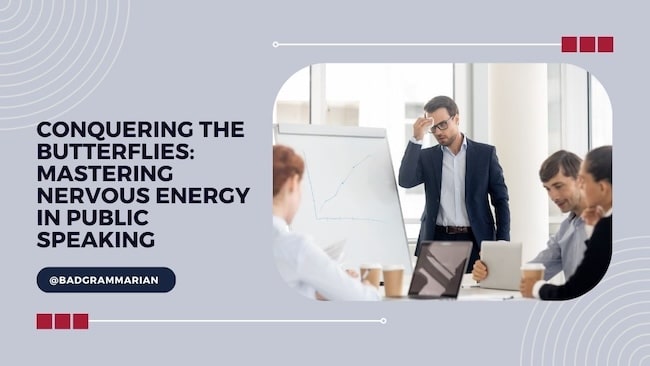Best Noise-Canceling Headphones for Writers: Enhance Focus and Creativity
Conquering the Butterflies: Mastering Nervous Energy in Public Speaking

Those fluttering sensations in your stomach, the fidgety hands, the unconscious pacing—if someone has ever stood before an audience, they have likely experienced these physical manifestations of nervous energy. These feelings are normal and can be harnessed to enhance a presentation.
Let's explore practical strategies for managing nervous energy, mainly when it manifests as restless hands and movement, and transforming it into a powerful tool for connection and impact.
Progressive Exposure: Start Small, Dream Big
Managing nervous energy begins with a gradual approach. Think of it as acclimatizing yourself to public speaking through progressive exposure. Just as you wouldn't run a marathon without training, you shouldn't expect to conquer speaking anxiety by immediately addressing a packed auditorium.
Start with smaller, more comfortable environments:
- Team meetings where you present for just a few minutes
- Friendly gatherings where you can practice storytelling
- Supportive communities like Toastmasters clubs
This approach is validated by the experiences of history's great orators. Daniel Webster, whose eloquence later captivated the U.S. Senate, couldn't even finish his first speech due to overwhelming nerves. John Bright, a celebrated English orator, was so anxious during his maiden speech that he arranged for a companion to prompt applause to boost his confidence.
Each small success rewires your brain, teaching it that public speaking isn't the threat it perceives. The nervous system gradually learns that survival isn't at stake, allowing you to access higher cognitive functions even under pressure. With each positive experience, the anxiety associated with speaking diminishes, making room for confidence to grow.
Participating in Toastmasters International club meetings can help you practice your prepared speeches through various projects in front of a small, supportive audience. Additionally, the Table Topics sessions allow you to improve your impromptu speaking skills. The more experience you gain speaking in front of an audience, the better prepared you will be when the stakes are higher.
Seeking Feedback and Learning from Experience: The Path to Mastery
Growth in public speaking rarely happens in isolation. Active feedback is crucial in developing awareness of how your nervous energy manifests physically.
The Role of Feedback

- “Did my hand gestures enhance or distract from my message?”
- “Was my movement purposeful or random?”
- “Did my body language align with my words?”
This external perspective is invaluable because our self-perception while speaking often differs dramatically from how others see us.
The Power of Deliberate Practice
Practice doesn't just make perfect—it makes permanent. When rehearsing your speech, focus not just on content but on your physical presence:
- Purposeful gestures: Research by Dr. David McNeill shows that gestures and language are intimately connected. Practice incorporating gestures that emphasize key points, keeping them within your “power sphere”—from the top of your eyes to your belly button and outstretched hands.
- Recorded rehearsals: Video yourself practicing to analyze your movements objectively. Are you swaying excessively? Are your hands flying erratically? These recordings provide concrete data about habits you may not realize you have.
- Consistency: As Michael Port notes, “You're always performing when in front of an audience.” Your training during practice dictates how you respond under pressure. Make deliberate movement and gesture control part of every rehearsal.
Each speaking opportunity, regardless of size, provides valuable experience that builds your confidence muscle and reduces anxiety over time. The more you practice managing your physical energy in low-stakes situations, the more natural it becomes when the stakes are higher.
Online courses on public speaking are also available and they can help you build strong foundations.
Accepting Imperfection: The Liberation of Authenticity
Perhaps the most important mindset shift is embracing the reality that some level of nervousness is not just normal—it's universal. Even seasoned professionals experience butterflies before taking the stage.
Reframing Nervous Energy
Instead of viewing nervousness as an enemy, reframe it as positive excitement. That adrenaline rush can be transformed into vitality and enthusiasm that captivates your audience. The physiological responses to fear and excitement are remarkably similar—it's our interpretation that differs.
The Vulnerability Factor
Don't apologize for feeling nervous. Often, the audience won't even notice unless you draw attention to it. However, occasionally acknowledging your nerves in a brief, authentic way can actually endear you to the audience. As TED curator Chris Anderson suggests, being real opens the door to trust.
That said, researcher Brené Brown cautions against contrived vulnerability, emphasizing that any personal sharing should serve the work on stage, not personal emotional needs.
Audience Focus: The Ultimate Distraction
Shift your focus from internal anxieties to your message and your audience:
- What is the key idea you want to convey?
- How can you best serve your listeners?
- Why does this message matter?
As one speaking coach suggests, writing “THIS MATTERS” on your notes can keep your priorities straight when nervous energy threatens to derail your focus.
Embracing Human Connection
Remember that perfect presentations rarely create the deepest connections. Often, it's the authentic, slightly imperfect moments that make you relatable and build trust with your audience. Minor stumbles humanize you and can actually strengthen your relationship with listeners.
Bringing It All Together: Your Journey to Confident Speaking
Managing nervous energy in public speaking is a journey, not a destination. You can transform those butterflies into a powerful force that propels your message forward through progressive exposure, active feedback seeking, deliberate practice, and embracing imperfection. We have also created a list of our favorite books on public speaking that offers additional tips for conquering your next presentation.
The fidgety hands that once distracted can become expressive tools that emphasize your points. The restless energy that made you pace can be channeled into purposeful movement that commands attention. And the racing heart that once felt like a liability becomes the passionate beat that gives life to your words.
Remember: The goal isn't to eliminate nervous energy—it's to harness it. With consistent effort and a positive mindset, you can develop a speaking presence that is both powerful and authentically you.
What step will you take today to transform your nervous energy into your greatest speaking asset?
Yes! I want Bad Grammarian updates and promotions!
No Spam Zone. We will never spam or sell your email address!
Yes! I want Bad Grammarian updates and promotions!
No Spam Zone. We will never spam or sell your email address!


